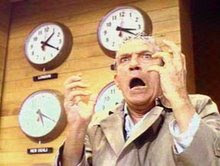"I was hopeless at maths and science. I just didn't get it." It's a statement I've heard a lot and I heard it again during a conversation I was having on friday night. It often follows the question, "So, what do you do?". Usually the topic of conversation changes and I don't get the chance to give a simple description of what science is, and how in fact most people practice science everyday without realising it. Now, one of the reasons I took up teaching was to show the beauty and power of these two topics. So here goes an attempt to give a primer on science.
You are sitting in the lounge reading a book with the lights on. At the end of a chapter you disappear to the kitchen to make a cup of coffee. You come back to the lounge room and the light is out. What do you do?
Option 1
God did it. You sit down and that's it. Some prefer this and spend the rest of their lives in the dark.
Option 2
You decide to find out why the light is out. There must be some natural explanation. Believe it or not, this is the first step in thinking scientifically. So why is the light out? The bulb may have blown.
If this is your only reason you can think of, then you are just a novice scientist. A good scientist will trying to think of many reasons why the light may be out. It may be that your flatmate came in and switched off the light, a fuse may have blown or the electricity in the neighbourhood may be out. And sometimes there are reasons that although improbable, are possible. That possum living in the roof may have bitten through the wires. A thief has cut the power to your house in preparation for a robbery.
Now you have your reasons, where do you start? The simplest explanation is usually the go so you decide to see if someone has switched off the light. You perform an experiment. You flick the switch. Bingo! You go back to reading your book. However, sometimes it's not that easy. Sometimes it requires stepping outside the current problem and making other observations and doing more experiments. You may check other appliances in the room to see if they work. This can help narrow the range of reasons. You may need to ask the advise of others who have had similar problems. You keep trying different ideas, throwing out the ideas that don't work. This way of thinking is an example of the scientific process.
The next question is, what is the difference between good science and bad science? That I'll leave to another post.
Subscribe to:
Post Comments (Atom)

5 comments:
Door as in Gaiman? Or as in Theo?
Godless hippy,
The light wouldn't go out if you were reading the Good Book for once. God would keep it on becuase he loves you and wants you to be saved.
Hah! Godless hippy. That's awesome. I can't even tell if anonymous is being sarcastic or serious.
If he/she is actually serious, I have a question...
In the history of electricity and churches, has there ever been a light globe go out in a church or other Christian establishment? Or in fact, at the house of anonymous? Because, if any light globes have ever been replaced even once, then by your logic, God doesn't love you or the patrons of the churches either...
Dear A-man,
There is a circle in Hell set aside for people who ask rhetorical questions. They sit next to the sarastics, those who make puns, and those who blind their hearts and minds to the truth by using tricks of language.
Of course lightbulbs eventually go pop. They are man's inventions, not God's creations.
If God wants a person to read the Good News, He will intervene in the world as necessary. That is proved a thousand times in the Old and New Testament. I suggest you educate yourself.
But if you "scientists" want to do the world a service, why don't you get yourself to a church one time, with a pencil and pad, and observe there if a lightbulb blows and observe whether anyone at the time was reading a Bible.
Instead you use poor logic to make the nasty minded joke that if a lightbuld goes out then God has foresaken his believers. I will give you the benefit of the doubt and assume that you are a callow youth and do not know what you say.
"Proved a thousand times in the Old and New Testament"?
Anonymous, you accuse A-man of poor logic and then base your argument on the assumption that something is in a book, so it must be true? Where is the tangible evidence? This post is about science and proof, which you have provided none of.
I wonder; if Harry Potter was written 2000 years ago, would we take that to be fact also?
Post a Comment